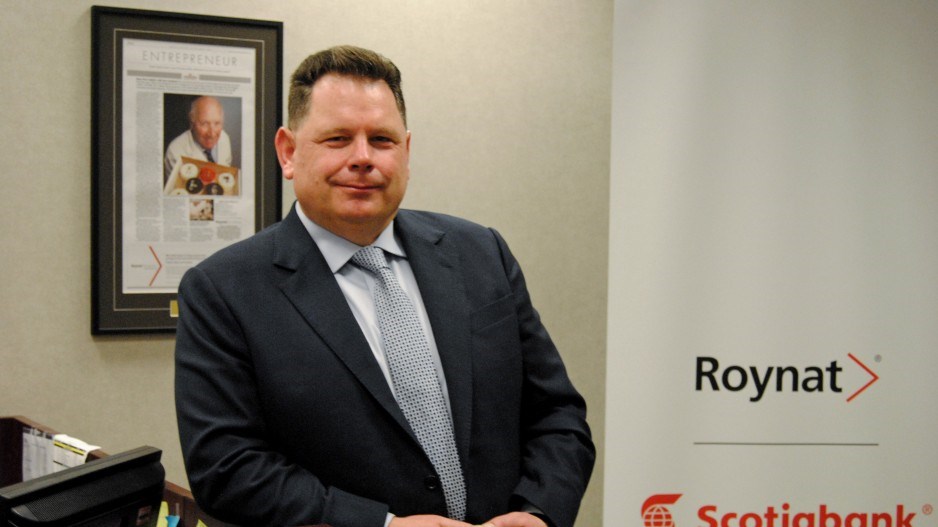Like residents in search of housing, the Lower Mainland’s industrial land crunch has created serious affordability and availability challenges for local businesses.
“There’s so much parallel between the residential market and the industrial market,” said Derek Strong, regional director of Roynat Capital. “They face the same constraints. There’s high demand and limited supply, and as a result, it drives prices up.”
Roynat, owned by Scotiabank (TSX:BNS), tops Business in Vancouver’s Top 100 Money Sources lists of B.C.’s biggest asset-based and mezzanine lenders, respectively.
Its niche is leveraged finance: the firm can offer up to 100% financing on owner-occupier commercial and industrial real estate purchases by businesses that would rather invest their income in their company than put together a multimillion-dollar down payment. That service makes up around 50% of Roynat’s lending portfolio. And as the provincial economy has grown, so have businesses, so have land values and so has Roynat.
“We’ve seen a lot of growth of small and medium-size enterprises in the marketplace. More businesses starting, more businesses growing, and as a result the need for financing has increased,” said Strong, adding that Roynat has gone from one to four locations, and from six to 15 employees, over the last three years.
In layman’s terms, Strong calls Roynat an income-statement lender that looks at the strength of a company’s financials first, and its assets second. On a case-by-case basis, Roynat offers loans between $1 million and $50 million to companies with earnings before interest, taxes, depreciation and amortization of $500,000 or more.
“In markets with significant asset appreciation, either when it comes to real estate or business values, leveraged lenders like Roynat have greater opportunities to do business,” said Strong.
The Business Development Bank of Canada (BDC), fourth on BIV’s list of biggest mezzanine lenders, offers similar leveraged financing options of up to 100% on a case-by-case basis. It has increased its exposure and market share in the Lower Mainland enough to open two new business centres over the last number of years.
“Our mandate is to take more risks with entrepreneurs,” said Greg Richard, manager of BDC’s Vancouver business centre, noting that traditional lenders in the market do offer leveraged finance, though not as regularly as BDC.
Both of BDC’s additional branches were launched three years ago, but have only recently been able to move out from under the bank’s Vancouver office due to challenges finding commercial space. That hints at the bigger issue: the money is there for businesses that need the capital to expand or relocate; the land isn’t.
Pacific Bolt Manufacturing Ltd. started looking for new space fairly aggressively about a year ago and was able to secure a Langley-based facility to move into later this year. According to president and owner Trevor Borland, the company would have been facing a million-dollar equity investment had it not secured a fully leveraged deal from a major Canadian lender.
Borland said that just two industrial spaces were available when the company started looking.
“Industrial property [is] getting squeezed and it’s getting squeezed real big,” he said. “I don’t think the government on a local level, provincial or federal level is doing enough to stop this. Residential is one thing, but when you’re talking about businesses getting into this type of debt load … they employ people.”
Native Northwest finds itself in a similar space struggle. According to general manager Gabe Garfinkel, its business operations have “far outgrown” the company’s 6,000-square-foot warehouse of 15 years in Vancouver, but a lack of land supply has hamstrung expansion.
The company – which sells high-quality, wholesale products designed by Indigenous artists – has been searching for more space for two years.
Moving to another region is “out of the question” due to the company’s close relationship with the Musqueam First Nation.
“I have a list in front of me of 11 clients that all want to buy something in a 20,000-to-50,000-square-foot size range, and there’s just nothing on the market for them,” said Stefan Morissette, vice-president, industrial, at Colliers International.
“There’s zero supply in all of the core markets currently.”
Morissette has found that the majority of clients want to talk to high-leverage lenders like Roynat and BDC right up front, despite the fact that their services come with higher premiums.
“They can sometimes even lend them more money than the traditional bank can, so it allows them to stretch a little further,” said Morissette.
And stretching is often needed. Surges in industrial land values have mimicked those seen in the residential market.
“In the last year to two years, you’ve seen price increases upwards of 30%,” said Morissette. “That hasn’t slowed yet.”
Marcus Ewert-Johns, chairman of the BC Alliance for Manufacturing, estimates that 70 B.C. manufacturers have moved or opened new facilities in Bellingham over the last five to seven years.
He flags an acute lack of supply, which in turn causes upward pressure on land prices.
“Everybody’s obsessed with the cost of housing being dramatically increasing and unaffordable. But the same issues affect businesses,” he said.
“I don’t think financing’s the issue. I think it’s financing to the amount you need. Good luck finding industrial land or a small building under $5 million anymore.”•




